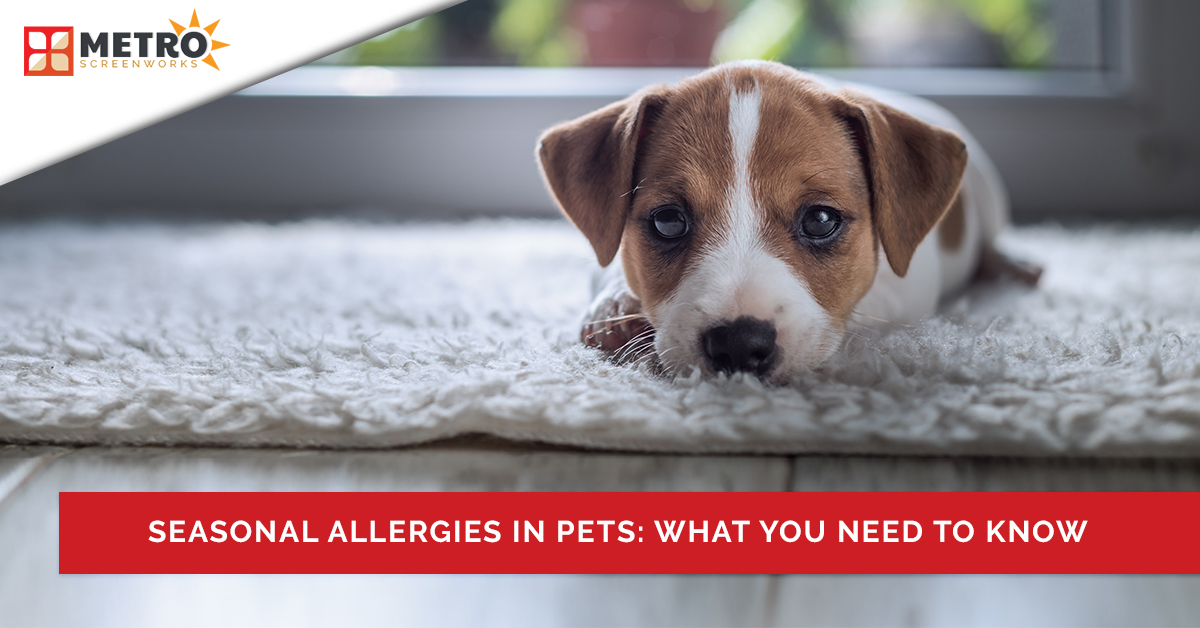May 11th 2020
Seasonal Allergies in Pets

Seasonal Allergies in Pets
Springtime is a wonderful time of year. Temperatures are finally starting to rise and the dead, brown ground is starting to brighten with new, green foliage. It’s an exciting time of year! However, for many, the excitement is dampened by allergies. Whether it’s a little more congestion than normal or feeling feverish from extreme irritation, it’s not fun to experience. When the flowers begin to bloom, it’s not just people that can have the sniffles, watery eyes, or rashes due to seasonal allergies. Our pets can also suffer from allergies.
Today on the Metro Screenworks blog, we are going to continue talking about air quality within our homes and how we can help our furrier family members also have a better quality of life when we install Allergy Guard window screens. Allergy Guard air filtration screen mesh are engineered to keep pollen and other allergens outside our homes by catching them before they can even pass through our window screens. What’s more, Allergy Guard offers protection against bacteria and viruses — the coronavirus included. Metro Screenworks also offers other products that can help keep you and your family, as well as the community at large, safe during this difficult time. Learn more on our website.
Seasonal Allergies in Pets: What You Need to Know
Just like hay fever and seasonal allergies for their human counterparts, pets suffering from allergies are common. However, it can be a little more difficult to pinpoint the actual source of the irritation for pets as there are many plants and pollutants that can affect our four-legged family members. It's also difficult to keep them away from these allergens as our pets tend to spend a lot of time outside. However, there are ways to help mitigate their allergies and help them feel better even during the peak of allergy season.
Wondering what allergies are? Read one of our recent blog posts, “ What Are Allergies?“

Because our pets can’t unfortunately speak to us, it can make trying to help them stay healthy and happy difficult. However, when you know the signs that indicate that they have allergies, it can make it easier to know how to help them — alleviating their discomfort and potentially eliminating the source causing the allergies.
Symptoms
The symptoms our pets experience as a result of allergies are much like what we experience as well. Symptoms to look for when your pet is suffering from seasonal allergies include:
| Watery eyes | Runny Nose | Sneezing | Respiratory Congestion | Itchy, flaky skin | Excessive shedding | Itching |
| Ear infections | Shaking their head | Scratching one or both ears | Smelly and/or dirty ears | Licking of the paws or anus | Scooting | Patchy skin or skin irregularities |
- Pollen
- Grass
- Weeds
- Mold
- Fungi
- Flea saliva

Prominent Symptoms in Dogs
Dogs are most likely to be affected by skin-related allergic reactions so if your pet seems to be biting, scratching, and licking themselves more than normal, it is a clear sign that they are most likely suffering from allergies. Often chronic scratching can lead to skin inflammation and even infection. Taking your dog to the vet is best to make sure your pup stays healthy and avoids complications. However, you can use coconut oil as well as green and black tea bags to help moisturize and soothe their skin.

Prominent Symptoms in Cats
Cats, on the other hand, will lick their paws as a normal part of their grooming. Cats who are suffering from allergic reactions will tend to be more affected by respiratory issues such as allergic bronchitis also called feline asthma. If your cat is breathing with difficulty, coughing, and/or wheezing, they may be suffering from allergies. It is best to take feline friends to the vet when they are having respiratory difficulty as respiratory issues can be related to other more serious health concerns.

Most Common Causes of Allergies
Pets in many cases are allergic to the same things that we are. Common environmental allergens include:
Other substances that can cause allergic reactions include pollutants, ingredients in their food, medication and injection allergies, and other environmental factors.
How to Help Your Pet Deal With Seasonal Allergies
One of the best ways to help your dog or cat deal with seasonal allergies is to first consult your vet. They can not only help to make sure that the symptoms that your pet is showing is indeed allergies, but they can also provide you with tips that will help your pet with their specific symptoms feel better. However, here are a few ways to alleviate the effects of allergies.

Change Up Your Walk Routine
Certain times of day, such as early morning and late afternoon, tend to have the highest pollen levels of any other time of day. So, if possible, take your pet for a walk at times of day with lower pollen levels. Also, consider changing up your walk route. Fields and similar areas are usually ripe with plants that cause allergic reactions. Try to find other areas to take your furry friend for a walk.

Clean Your Home Frequently
Cleaning your home frequently can help to get rid of dust, pollen, and other allergens that can accumulate — dust and vacuum weekly! When cleaning your home, be sure to clean the surfaces that your pet comes into contact with such as their dog bed, your bed, and even their toys — especially plush toys. Wash their bed, blankets, toys, and other items often to avoid allergen accumulation.

Clear The Air
Moderating the air quality of your home can also help to alleviate the allergies that your pets are experiencing. Running the air conditioner and a dehumidifier can combat the effects of moisture which can then keep mold at bay. Also, installing air filtering window screens can also help to keep pollen and other allergens — and even coronavirus — from getting into your home. Install Allergy Guard in your window screens and screen door to keep pollen and allergens from even entering your home.

Treat Your Pet to A Bath
Bathing your pet more frequently can also help to cut down irritation from allergies. However, it is important to select a hypoallergenic anti-itch shampoo that contains soothing ingredients such as oatmeal, aloe, or evening primrose oil. Using the right shampoo is important for helping your pet’s skin and fur stay moisturized even with the extra baths. A short 10 minute soak in a bath with moisturizing oil can also help your pet’s skin feel healthy and itch-free.

Clean Your Pet’s Bed & Bowls
Frequently cleaning your pet’s bed and bowls can help to keep mold and other allergens from contributing to their allergies. Wash their bowls every few days. Wash their bed weekly or as needed and consider placing blankets or towels over their bed to keep pollen, dust and other substances from settling on their sleeping areas.

Consider Supplements
Adding supplements to your dog’s diet can also help to soothe their irritated skin and help your furry family member to feel healthy and happy. Fish oil, fatty acids like omega-3, omega-6, as well as coconut oil can help your pet’s skin and fur remain soft, moisturized, and healthy.
To help your pet be healthy and happy even during the height of allergy season, utilize these tips. Also, be sure to shop Allergy Guard on our website! To learn more about this specialty window screen mesh, read our recent blog post, “ Do Air Filtration Screens Work?” Allergy Guard can be purchased as complete window screens as well as in bulk screen rolls for easy installation in any part of your home. Learn more about Allergy Guard today!


